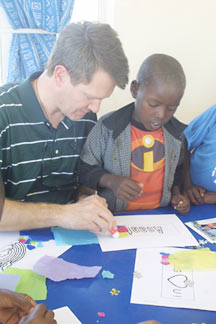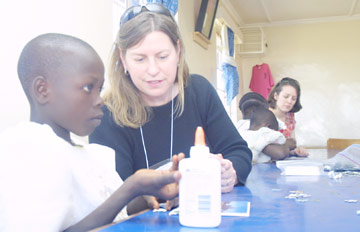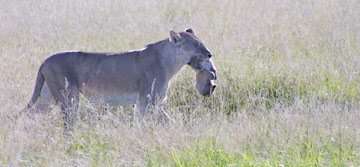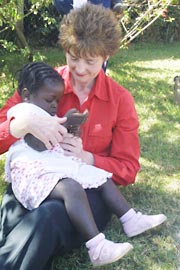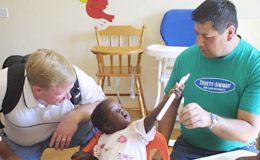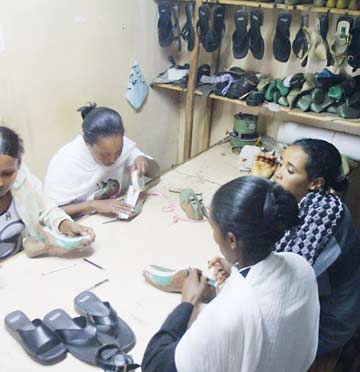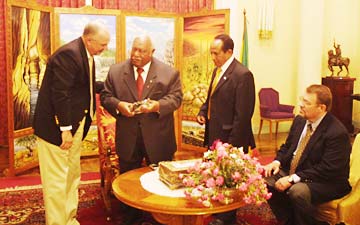Posted: 2/21/07
|
| "Pastor Eutychus"–Euticauls Wambua Nzengu, who has served 20 years ministering in Nairobi's Korogocho slum–visits with Lee and Susan Bush from First Baptist Church in Athens, members of a Buckner mission vision team. In the background is the city's largest garbage dump. (Photos by Ken Camp) |
Dispatches: In Nairobi's Gehenna
By Ken Camp
Managing Editor
Wednesday, Feb. 21, Nairobi, Korogocho slum
Today we saw the presence of Christ in the heart of hell.
Nairobi's Korogocho slum is home to somewhere between 350,000 and 600,000 people, roughly half of them children and teenagers. The average lifespan of a boy in that slum is 14 years. Girls live a little longer, but many end up dying of AIDS after turning to prostitution, just to survive.
Euticauls Wambua Nzengu–"Pastor Eutychus"–has spent two decades serving there. He grew up in eastern Kenya, the product of a polygamous marriage. Eventually, he went to Nairobi seeking a job and lived with his uncle, who was a pastor. Twenty years ago, he came to a saving faith in Jesus Christ. And almost immediately, he felt God calling him to work with the children of Korogocho.
 |
| Pastor Tim Watson from First Baptist Church in Longview helps a child from the Kariobangi Baptist Youth Center in Nairobi's Korogocho slum try on a sweater delivered by a Buckner mission team. |
For nine years, he worked with the children at Highridge Baptist Church and started the youth program at that congregation, which meets in a room at the Kariobangi Baptist Youth Center.
Later, that church sent him out to plant another congregation–Baptist Chapel–which, in turn, has launched three mission churches. Ever since the Southern Baptist International Mission Board withdrew its support from the youth center, Pastor Eutychus has directed its programs as a local church ministry.
A few months ago, 60 students from early preschool to about the fourth grade attended daily classes at the center. Today, 210 children from the slum fill seven classrooms. Older teenagers have the opportunity to learn a trade–hairdressing for women and woodworking for men–in the center's vocational education program.
Students receive a nutritious meal at noon–the only meal many of them are sure to eat on any given day. The center does not have an ongoing medical clinic, but it has hosted visiting physicians on occasion, and they averaged about 500 patients a day.
When we arrived at the center, and Ken Hall caught sight of Pastor Eutychus, he quietly said to a couple of people standing near him,"We're on holy ground right here, holy ground."
Indeed it was, but the surrounding area was anything but that.
Looking over the walls around the center, it was easy to see–and especially smell–Nairobi's largest garbage dump.
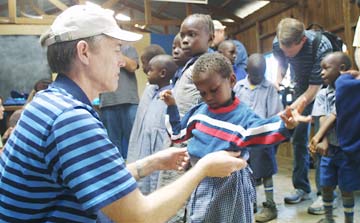 |
| Jay Chastain of First Baptist Church in Longview helps a child try on a sweater. |
We saw trash pickers making their way through the rancid mounds, looking for anything of value. And we saw women washing out plastic trash bags in a dirty stream so they could sell them to someone who needs plastic sheeting for shelter.
Eutychus told us we were fortunate today. It was one of the rare days the smoke from burning trash was not wafting over the slum. He said TB had become endemic in the area because of the persistent smoke.
Tim Watson immediately made the connection. When Jesus described hell, he compared it to Gehenna–the smoldering garbage dump on the outskirts of ancient Jerusalem.
This place really is hell on earth, and Pastor Eutychus literally is trying to snatch these children out of hell–in every sense.
Our group was privileged to deliver bags of donated sweaters to the youth center. Unfortunately, the student population had grown so rapidly in recent months, we didn't have enough sweaters for all the children. So, Eutychus selected about a dozen to receive sweaters today, more will get the remaining sweaters soon and Buckner will send additional sweaters later.
Our team sorted the sweaters by size, and then several people helped the lucky few children try on their new sweaters. Today was Jay Abernathy's birthday. He told us he couldn't imagine a more meaningful way to celebrate the occasion.
On Sunday, we saw poor-but-beautiful children filled with joy, living at the Baptist Community Center. Today we saw children in rougher circumstances, but hardly less joyful, attending classes at the youth center. But outside the gates of the center, we saw children who looked at us with eyes that held no joy, no hope.
Just across a rough, dirt road littered with debris, I saw a toddler playing just outside the door of his parents‚ shanty. Less than two feet away, raw sewage ran in a drainage ditch. The Kariobangi Baptist Youth Center is just a small candle burning in a dark place–an oasis of hope in a sea of hopelessness. But we also saw reason to hope.
While we were at the youth center, we met Joseph. He told us he grew up "a stone's throw away from here. This is home to me." He described some of the hardships he faced growing up in a slum where most families live on less than $1 a day. He helped his family by doing domestic chores and working as day laborer, but he also managed to go to school.
Joseph went on to become a house parent at the Baptist Community Center we visited on Sunday. He resigned recently when he married Elizabeth, who works with Dickson at the Nairobi Baptist Center.
Because of the living arrangements at the BCC, married couples cannot be house parents in an all-girls or all-boys dorm. But Joseph was too valuable a worker to lose, so he was made an assistant to help with the ministries.
He told us: "Thank God, he saw me through, and I feel God calling me to minister among other children who are struggling as I did."
Pastor Eutychus, likewise, has made the decision to follow God's call and invest his life in the lives of slum children. He undoubtedly has received offers to go elsewhere. He has held key positions in the denomination˜in Kenya, on the African continent and within the global fellowship of the Baptist World Alliance. He is a brilliant and articulate man. But he has chosen to remain. Ask him why, and he answers: "If Jesus came today, I know he would be here. And if I leave, who will continue this work?"
Today, we went to hell. And we saw Jesus at work there.
News of religion, faith, missions, Bible study and Christian ministry among Baptist churches, in Texas, the BGCT, the nation and around the world.
![]()
![]()
![]()
![]()
![]()
![]()
![]()
![]()

